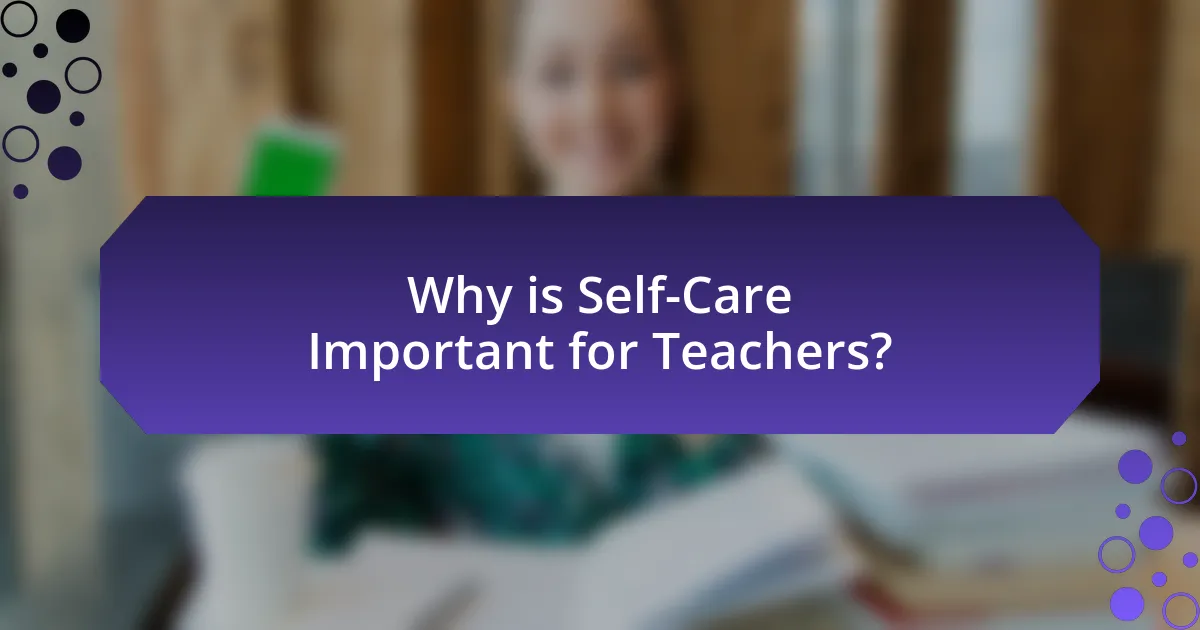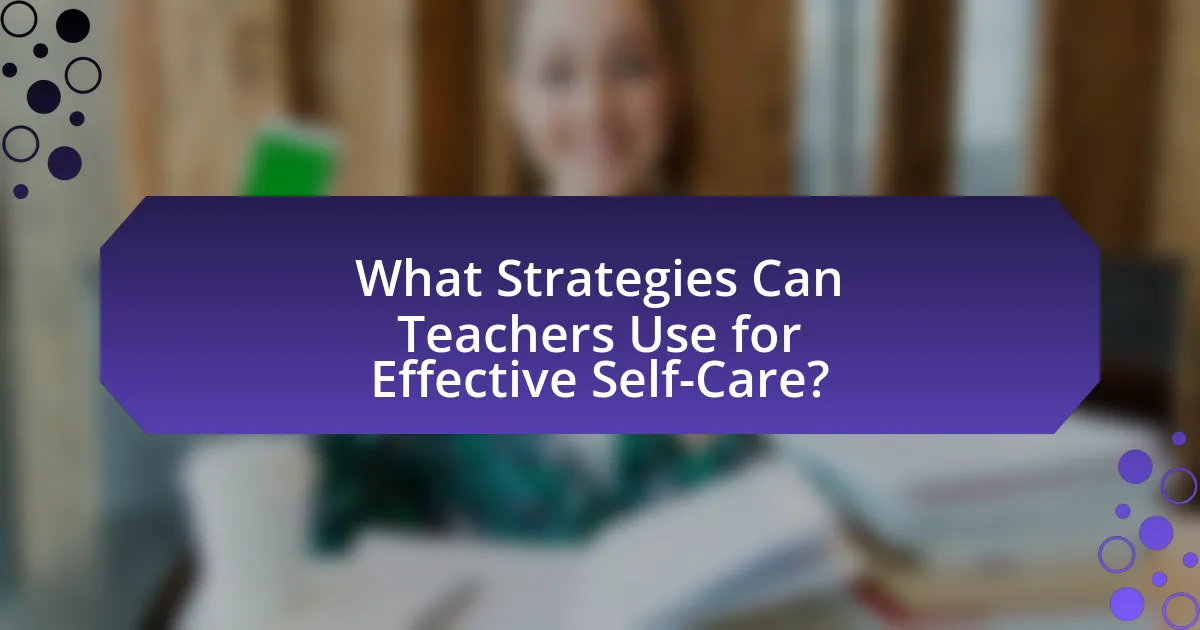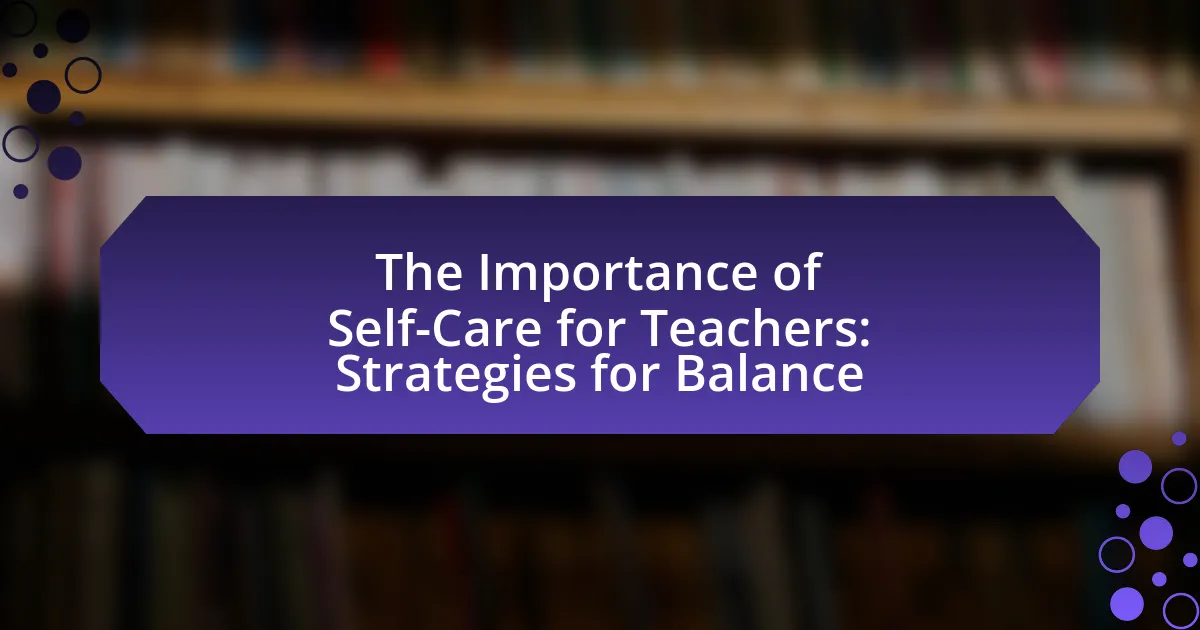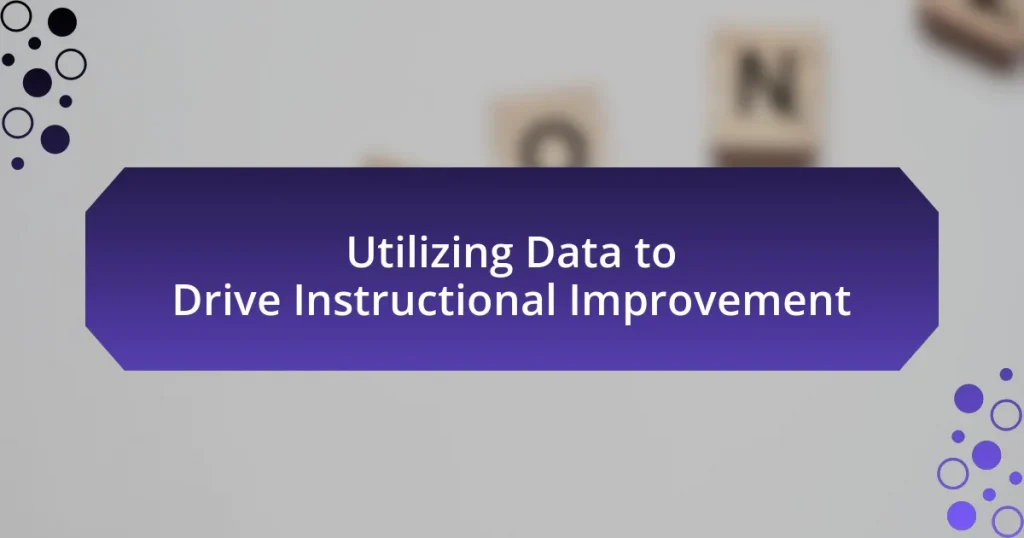The article focuses on the importance of self-care for teachers, emphasizing its impact on their well-being, effectiveness, and ability to support students. It outlines the unique challenges teachers face, such as high stress levels and emotional exhaustion, which necessitate self-care practices to prevent burnout. The article discusses various self-care strategies, including mindfulness, physical activity, and setting boundaries, and highlights how these practices can enhance teachers’ mental health, job satisfaction, and overall classroom performance. Additionally, it explores the role of peer support and school culture in fostering a supportive environment for self-care among educators.

Why is Self-Care Important for Teachers?
Self-care is important for teachers because it directly impacts their well-being, effectiveness, and ability to support students. When teachers engage in self-care practices, they experience reduced stress, improved mental health, and enhanced job satisfaction. Research indicates that teachers who prioritize self-care are less likely to experience burnout, which affects approximately 44% of educators according to a study published in the Journal of Educational Psychology. This reduction in burnout leads to better classroom environments and more effective teaching, ultimately benefiting student outcomes.
What are the unique challenges teachers face that necessitate self-care?
Teachers face unique challenges such as high levels of stress, emotional exhaustion, and workload demands that necessitate self-care. The teaching profession often involves managing diverse classroom dynamics, meeting varied student needs, and adhering to strict curriculum standards, which can lead to burnout. Research indicates that approximately 50% of teachers report feeling overwhelmed by their responsibilities, highlighting the critical need for self-care practices to maintain mental and emotional well-being. Additionally, the emotional labor involved in supporting students’ social and emotional needs further exacerbates stress levels, making self-care essential for sustaining their effectiveness and overall health.
How do these challenges impact teachers’ mental health?
Challenges such as high workloads, lack of support, and student behavioral issues significantly impact teachers’ mental health by increasing stress and leading to burnout. Research indicates that teachers experiencing high levels of stress are more likely to report symptoms of anxiety and depression, which can adversely affect their job performance and overall well-being. A study published in the Journal of Educational Psychology found that nearly 50% of teachers reported feeling overwhelmed by their responsibilities, contributing to a decline in mental health and job satisfaction.
What role does stress play in a teacher’s professional life?
Stress significantly impacts a teacher’s professional life by affecting their mental health, job performance, and overall well-being. High levels of stress can lead to burnout, which is characterized by emotional exhaustion, reduced personal accomplishment, and depersonalization. Research indicates that approximately 40% of teachers experience high levels of stress, which can result in decreased job satisfaction and increased turnover rates. Furthermore, stress can impair a teacher’s ability to effectively engage with students, leading to a negative impact on student learning outcomes. Therefore, managing stress through self-care strategies is essential for maintaining a healthy and productive teaching environment.
How does self-care benefit teachers personally and professionally?
Self-care benefits teachers personally by enhancing their mental and emotional well-being, which leads to reduced stress and burnout. When teachers engage in self-care practices, such as mindfulness or physical exercise, they experience improved mood and increased resilience, allowing them to manage classroom challenges more effectively. Professionally, self-care contributes to better job performance and student outcomes; research indicates that teachers who prioritize self-care are more engaged and effective in their roles, resulting in higher student achievement. A study published in the Journal of Educational Psychology found that teachers who practiced self-care reported greater job satisfaction and lower levels of emotional exhaustion, reinforcing the importance of self-care in both personal and professional domains.
What improvements can teachers expect in their well-being through self-care?
Teachers can expect significant improvements in their well-being through self-care, including reduced stress levels, enhanced emotional resilience, and increased job satisfaction. Engaging in self-care practices, such as mindfulness, exercise, and adequate rest, has been shown to lower cortisol levels, which are associated with stress. A study published in the Journal of Educational Psychology found that teachers who practiced self-care reported a 30% decrease in burnout symptoms and a 25% increase in overall life satisfaction. These improvements contribute to a healthier work-life balance, allowing teachers to perform more effectively in their roles.
How does self-care influence classroom performance and student outcomes?
Self-care significantly enhances classroom performance and student outcomes by improving teachers’ mental and emotional well-being. When educators prioritize self-care, they experience reduced stress and burnout, which leads to more effective teaching practices and a positive classroom environment. Research indicates that teachers who engage in self-care are more likely to foster student engagement and motivation, as their improved well-being translates into better interactions with students. A study published in the Journal of Educational Psychology found that teachers who practiced self-care reported higher levels of job satisfaction and lower levels of emotional exhaustion, directly correlating with improved student academic performance and behavior.

What Strategies Can Teachers Use for Effective Self-Care?
Teachers can use strategies such as setting boundaries, practicing mindfulness, and engaging in regular physical activity for effective self-care. Setting boundaries helps teachers manage their workload and prevent burnout by designating specific times for work and personal life. Practicing mindfulness techniques, such as meditation or deep-breathing exercises, can reduce stress and improve emotional well-being. Engaging in regular physical activity, supported by research from the American Psychological Association, has been shown to enhance mood and reduce anxiety, contributing to overall mental health. These strategies collectively promote a balanced lifestyle, essential for teachers to maintain their effectiveness in the classroom.
How can teachers incorporate mindfulness into their daily routines?
Teachers can incorporate mindfulness into their daily routines by integrating short mindfulness practices, such as deep breathing exercises or guided meditations, into their classroom activities. Research indicates that even brief mindfulness sessions can reduce stress and improve focus, enhancing both teacher well-being and student engagement. For instance, a study published in the Journal of Educational Psychology found that teachers who practiced mindfulness reported lower levels of burnout and higher job satisfaction. By dedicating just a few minutes each day to mindfulness, teachers can create a more balanced and supportive learning environment.
What mindfulness techniques are most effective for teachers?
Mindfulness techniques most effective for teachers include deep breathing exercises, body scans, and mindful walking. Deep breathing exercises help teachers reduce stress and enhance focus by promoting relaxation and clarity. Body scans encourage awareness of physical sensations, allowing teachers to identify and release tension. Mindful walking fosters a connection to the present moment, improving emotional regulation and overall well-being. Research indicates that these techniques can lead to decreased burnout and increased job satisfaction among educators, as evidenced by a study published in the Journal of Educational Psychology, which found that mindfulness practices significantly improved teachers’ mental health and classroom performance.
How can mindfulness practices be integrated into the school day?
Mindfulness practices can be integrated into the school day by incorporating short, structured activities such as mindful breathing, meditation sessions, or mindful walking during breaks. Research indicates that even brief mindfulness exercises can enhance students’ focus and emotional regulation, as demonstrated in a study published in the Journal of Educational Psychology, which found that students who participated in mindfulness programs showed improved attention and reduced stress levels. Additionally, teachers can model mindfulness by taking a few moments for themselves to practice mindfulness techniques, thereby fostering a culture of self-care and awareness within the classroom.
What physical self-care strategies should teachers consider?
Teachers should consider engaging in regular physical exercise as a primary self-care strategy. Exercise has been shown to reduce stress, improve mood, and enhance overall physical health, which is crucial for teachers who often face high levels of occupational stress. According to a study published in the Journal of Occupational Health Psychology, regular physical activity can lead to significant reductions in stress and burnout among educators. Additionally, incorporating practices such as stretching, yoga, or mindfulness can further support physical well-being and mental clarity, contributing to a more balanced teaching experience.
How does regular exercise contribute to a teacher’s overall health?
Regular exercise significantly enhances a teacher’s overall health by improving physical fitness, mental well-being, and stress management. Engaging in physical activity helps teachers maintain a healthy weight, reduces the risk of chronic diseases such as heart disease and diabetes, and boosts cardiovascular health. Furthermore, exercise releases endorphins, which are natural mood lifters, thereby alleviating symptoms of anxiety and depression that teachers may experience due to their demanding roles. Research indicates that regular physical activity can lead to a 30% reduction in stress levels, which is crucial for teachers who often face high-pressure environments. Thus, incorporating regular exercise into their routines is essential for teachers to sustain their health and effectiveness in the classroom.
What dietary habits can support teachers’ energy levels and focus?
Consuming a balanced diet rich in whole foods, including fruits, vegetables, whole grains, lean proteins, and healthy fats, can significantly support teachers’ energy levels and focus. Whole foods provide essential nutrients that stabilize blood sugar levels, preventing energy crashes and enhancing cognitive function. For instance, complex carbohydrates found in whole grains release energy slowly, while proteins from sources like fish and legumes support neurotransmitter function, which is crucial for concentration. Additionally, omega-3 fatty acids, prevalent in fatty fish and walnuts, have been shown to improve brain health and cognitive performance. Studies indicate that a diet high in antioxidants, such as those found in berries and leafy greens, can reduce oxidative stress and inflammation, further supporting mental clarity and sustained energy throughout the day.

How Can Teachers Maintain a Work-Life Balance?
Teachers can maintain a work-life balance by setting clear boundaries between their professional and personal lives. Establishing specific work hours and adhering to them helps prevent work from encroaching on personal time. Research indicates that teachers who implement structured schedules report lower stress levels and improved job satisfaction. Additionally, prioritizing self-care activities, such as exercise and hobbies, contributes to overall well-being, allowing teachers to recharge and remain effective in their roles. Studies show that teachers who engage in regular self-care practices experience enhanced resilience and reduced burnout, further supporting the importance of maintaining a healthy work-life balance.
What time management techniques can help teachers prioritize self-care?
Effective time management techniques that can help teachers prioritize self-care include setting clear boundaries, utilizing time-blocking, and implementing the Pomodoro Technique. Setting clear boundaries allows teachers to define work hours and personal time, reducing the risk of burnout. Time-blocking involves scheduling specific periods for tasks, including self-care activities, ensuring that these are treated as priorities. The Pomodoro Technique, which consists of working in focused intervals followed by short breaks, can enhance productivity while allowing time for self-care during breaks. Research indicates that structured time management can lead to improved well-being and job satisfaction among educators, reinforcing the importance of these techniques in maintaining a healthy work-life balance.
How can setting boundaries improve a teacher’s work-life balance?
Setting boundaries can significantly improve a teacher’s work-life balance by allowing them to allocate specific times for work and personal life, thereby reducing stress and preventing burnout. When teachers establish clear limits on their availability, such as not responding to emails after a certain hour or designating specific times for lesson planning, they create a structured environment that promotes mental well-being. Research indicates that teachers who implement boundaries report higher job satisfaction and lower levels of stress, as they can focus on their personal lives without the constant intrusion of work-related tasks. This structured approach not only enhances their overall quality of life but also positively impacts their effectiveness in the classroom, as a balanced teacher is more engaged and present for their students.
What role does delegation play in managing workload effectively?
Delegation plays a crucial role in managing workload effectively by allowing individuals to distribute tasks among team members, thereby reducing individual stress and increasing overall productivity. When teachers delegate responsibilities, they can focus on their core teaching duties and self-care, which is essential for maintaining balance in their professional lives. Research indicates that effective delegation can lead to improved job satisfaction and reduced burnout, as it empowers team members and fosters a collaborative environment. For instance, a study published in the “Journal of Educational Administration” found that teachers who practiced delegation reported a 30% decrease in workload-related stress, highlighting the tangible benefits of this strategy in educational settings.
How can teachers create a supportive community for self-care?
Teachers can create a supportive community for self-care by fostering open communication and collaboration among colleagues. Establishing regular check-ins and support groups allows teachers to share experiences and coping strategies, which has been shown to reduce stress and improve overall well-being. Research indicates that supportive work environments lead to higher job satisfaction and lower burnout rates among educators, as highlighted in a study published in the Journal of Educational Psychology. By prioritizing self-care discussions and creating a culture of mutual support, teachers can enhance their resilience and promote a healthier work-life balance.
What are the benefits of peer support among teachers?
Peer support among teachers enhances professional development, emotional well-being, and job satisfaction. Collaborative environments foster sharing of best practices, leading to improved teaching strategies and student outcomes. Research indicates that teachers who engage in peer support networks report lower stress levels and increased resilience, contributing to a more positive school culture. A study by the American Educational Research Association found that teachers involved in peer mentoring programs experienced a 20% increase in job satisfaction and a significant reduction in burnout rates.
How can schools foster a culture of self-care among staff?
Schools can foster a culture of self-care among staff by implementing structured wellness programs that prioritize mental health and work-life balance. Research indicates that schools with wellness initiatives, such as mindfulness training and stress management workshops, see improved staff morale and reduced burnout rates. For instance, a study published in the Journal of Educational Psychology found that teachers who participated in wellness programs reported a 30% decrease in stress levels and a 25% increase in job satisfaction. By providing resources, creating supportive environments, and encouraging open discussions about self-care, schools can effectively promote a culture that values the well-being of their staff.
What practical tips can teachers implement for ongoing self-care?
Teachers can implement practical self-care tips such as setting clear boundaries between work and personal life, engaging in regular physical activity, and practicing mindfulness techniques. Establishing boundaries helps prevent burnout by ensuring that teachers allocate time for relaxation and personal interests outside of their professional responsibilities. Regular physical activity, supported by research from the American Psychological Association, has been shown to reduce stress and improve mood, which is crucial for teachers facing daily challenges. Mindfulness practices, such as meditation or deep-breathing exercises, can enhance emotional resilience and focus, contributing to overall well-being.



